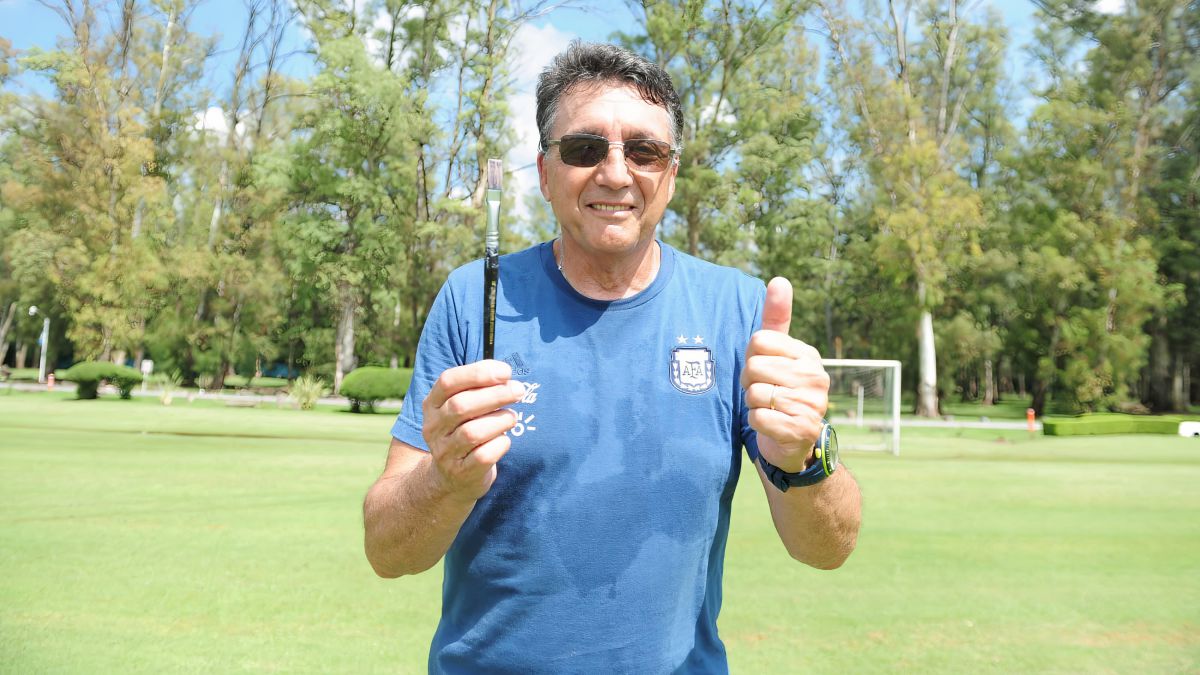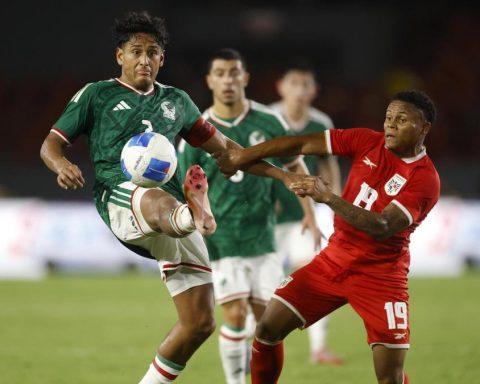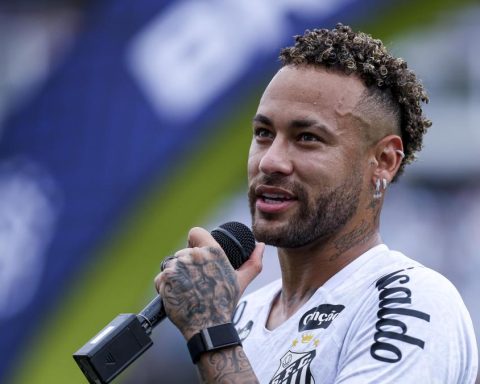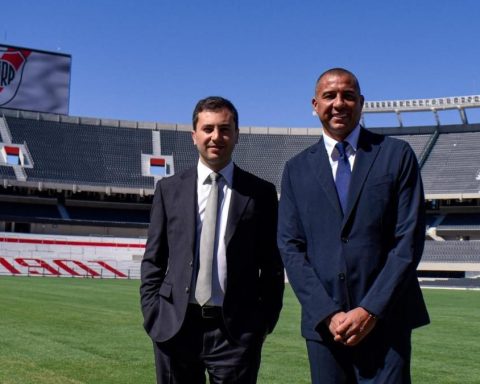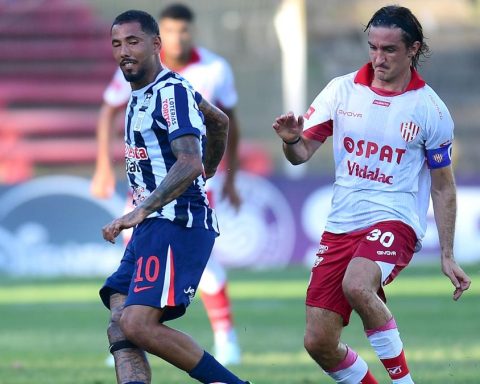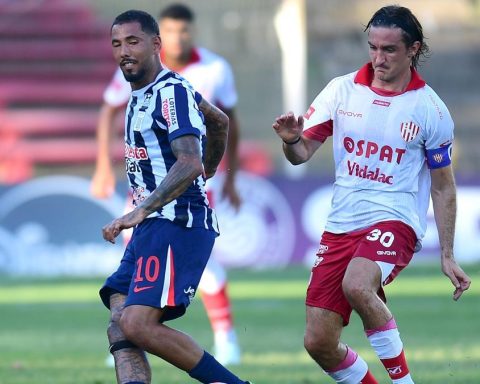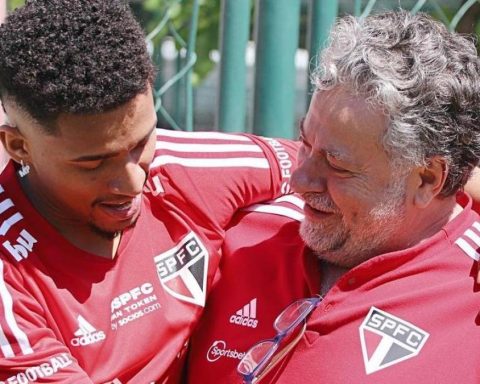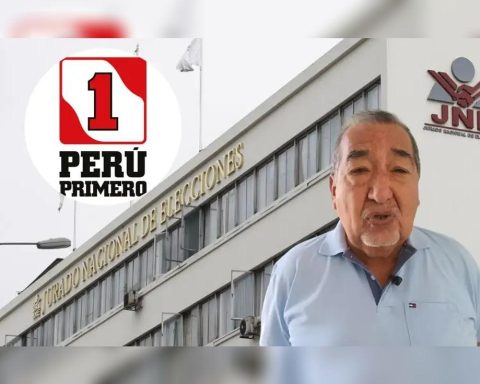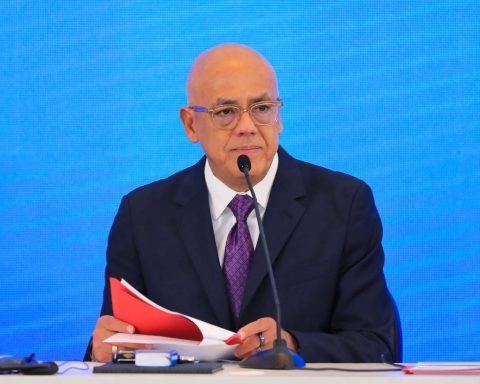The first time that Miguel Ángel Micó (Buenos Aires, 1947; 76 years old) saw Rodrigo de Paul, he was 9 years old and had just arrived at the Racing quarry. He was skinny, he remembers, and made an angry face when they sent him to run, he remembers. Many times he wondered what came to mind so many times with so many boys that he saw happen when he coordinated children’s soccer. “Reach?”. Today, when his figure is linked to the University, he feels proud of the player that De Paul has become, the one he saw with Argentina in the Copa América. That of which he was the foundation. In Racing. This is how he remembers it while the sound of a horn that filters through the windows of his apartment, on the first floor in Buenos Aires, accompanies him.
-What was De Paul like?
-It is from the players that it has started from below. He started out playing in a league called Metropolitana. We used it in case a boy came from the interior, we saw that he played well but we could not sign in AFA because the pass book was closed.
-How did you get to Racing?
-With 9 years. I was in charge of the Metropolitan League and a father said: “There is a boy in Belgrano … He is small, interesting, why are they not going to see him?” It was De Paul.
-What does it remind you of?
-That the last of the training sessions was leaving. That worked fine. Later I left Racing in 2008 and, some time later, I saw him in a Reserve match (subsidiary), I was the coordinator at All Boys and I congratulated the Racing technicians.
-Why?
-I saw him changed, with dynamics, intelligence on the court. Which, as a child, one said: “Will it arrive, will it arrive?”
-What did you see him when he was little?
-That he liked the ball. But at that age, not everyone matures at the same time. He was skinny but he had something daring. But if they told him something he didn’t like, he would make an angry face.
-When?
-He wanted to do his things, play how he wanted. And he was in those ages where he can’t be forced to play on a system. That is why the work of coaches in children’s football is so important. Because they don’t have support, because, out there, kids sometimes can’t come or they have other problems, and what they do to bring those kids to the level of high competition is what helps. They know how they live, eat, if they arrive early, if they don’t like such a thing, the way they speak… Rodrigo matured over time. I saw details in this Copa América that surprised me.
-Why?
-Because it is not easy to play against Brazil in Brazil and the way they did it. A personality on the court …
-Didn’t you sense him as a child?
-Yes Yes. What happens is that I am leaving Racing. I lost the day to day. I worked in other clubs, I didn’t follow up on him.
“De Paul at Atlético feels important. They make him feel”
-You said once in an interview in Argentina that you were one of those who did not run backwards.
-He wanted to play. Play and have the ball. Drive, give a pass. Logically one was seeing how he was going to instill other things in him. Sometimes he would say to the coaches: “Will he make a little more sacrifice?” “And yes, I think so,” they told me. It’s not easy, huh. To one who likes the ball, to play in touch, who sacrifices himself in running. But what he is doing. Now one says: “You can see that you have had technicians who knew how to do it.” Some time ago I saw a note in which he said that he considered Luis Zubeldia as a soccer father. And it made me very happy when I listened to him.
-He was the one who made him debut in First.
-I took Luis to Lanús. I had him as a player. And then, I say: “How good that an interior player like Luis, who came very young, 16 years old was, I think, when he arrived in Lanús, he had an impact on him.” He played in the U-15, U-17, U-19, he became professional but a knee injury took him away prematurely. Very young he dedicated himself to being a coach. And I heard him that Zubeldia had been a teacher and I thought I had guided him well. In addition to everything that he instilled in him to play, he did it in the human, to convince him of certain things. Technicians are the ones who mold.
-What was De Paul playing?
-He wanted to play in the middle and he played there. In Argentina, those who play more or less well immediately say: “It can be a hitch.” The owner of the team. And not everyone has the personality to be. He has to be a good passer, manage the times, good punch, skillful, intelligent and he liked it there. Today play where they put it. Because he can play on the right, on the left, in the middle, alone, with another …
-When he arrived in Spain, at Valencia, as a winger, he did not triumph.
-That’s why before I told you that not all mature at the same time. Maybe there are players who are going abroad and this is not the time to go. And it is difficult for them to adapt. For the family, for friends, for the weather … For various reasons. Then he returns to Racing, plays a few games, not many, and goes to Italy. And there was a moment that, between Udinese and the Argentine team, which begins to give everything it is now.
–At Atlético he has triumphed as soon as he arrived.
-That’s why, because it has matured. He has realized that this is his style of play and has also set the group. It feels important. They make it feel important. And he reached 27 years old. Sometimes, to a certain extent, it is also due to the coach, who looks for the way and the way and the moment to tell him things, and joins what the coach says to what he wants to give. It is in fullness.
-Did you coincide with Simeone in Racing?
-I was gone when Simeone was there. He retires at Racing and then leads the team. Rodrigo was in the quarry.
“El Cholo was a very leading player in the lower ranks. He was already prominent in the Sixth Division. At 15 he was: ‘Who marks Cholo?”
-And how do you see that marriage? From Paul-Simeone.
– (Laugh) I think they can get along very well. He has the dynamics that Cholo likes. A player who, if he has to recover, recovers, if he has to maintain a duel, he keeps it …
-Do you remember Simeone as a player?
-Do you know what happens? That Cholo was a very inferior player leader. He was already prominent in the Sixth Division. At 15 it was: “Who marks Cholo?”.
-Yes?
-At that time I was a Cerro coach, youth, and he played in Vélez and that was the classic in the West at the junior level. And Simeone was super outstanding. Because of its physique, dynamics, personality. I did not see De Paul play in Sixth but as he was not the player that …
-That it be said: “Who marks this?”.
-Nerd. Al Cholo is that you had to mark him between two. He played everything. From 8, from 5, of everything. And with a lot of personality. I already had it as a child.
– Are you surprised by your triumphs at Atlético?
-Nerd. Not at all. He is a technician who transcends. What he lived more than what he wanted. He lives football with a lot of passion and the coaches who live that way transmit a lot. Cholo could be seen to be a technician for Europe. It showed.
.
